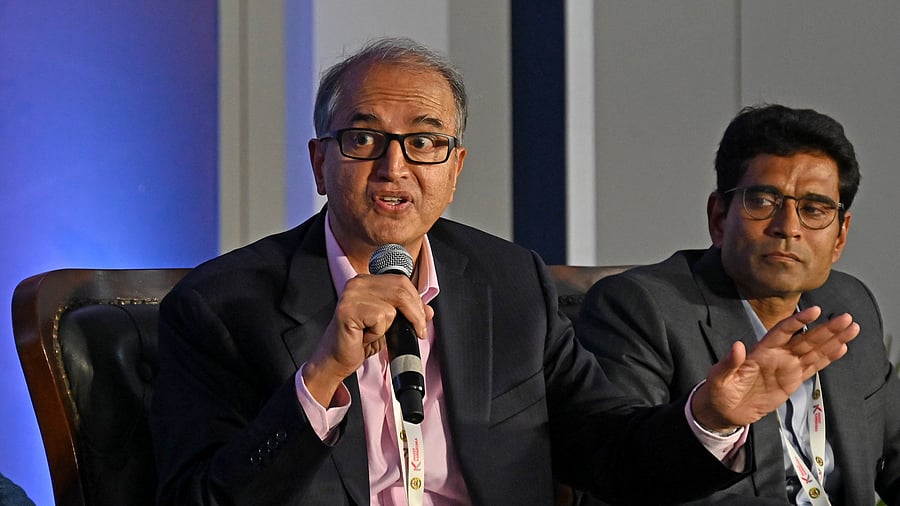
Narayana Hrudayalaya Chairman and a well known cardiac surgeon Dr Devi Prasad Shetty talks on 'India's Next Innovation Powerhouse: Karnataka’s Blueprint for KWIN City'at Invest Karnataka 2025, on Thursday.
Credit: DH Photo/Pushkar V
Bengaluru: The Karnataka government is planning to get the first 500 acres of the 5,800-acre Knowledge, Wellbeing and Innovation (KWIN) city functional in the next 18 months.
A government source told DH about the plan for the next one-and-a-half years at the state-of-the-art KWIN city, which is being developed 60 km away from central Bengaluru.
National and international educationists and university representatives shared the scope of the academic endeavour at the KWIN city during a meeting with ministers and state government officials on the second day of the three-day Invest Karnataka meet.
Noting that nine world-class universities, including Universities of Liverpool and St John’s, had signed MoUs, Large and Medium Enterprises Minister M B Patil clarified that they would ensure the value of the degree would remain the same even if a student graduated from the Indian branch of these universities.DH has learnt that St John’s University has signed MoUs with two Bengaluru-based universities.
“UGC regulations now allow the top 500 universities to establish campuses in India, presenting a significant opportunity for Western universities to set up branches in KWIN city at a low cost. This initiative will give students hands-on experience in research and development,” Patil explained.
‘Need for housing’
Aditya Virwani, chief operating officer of Embassy Group, emphasised that building a massive housing complex in KWIN city would propel research and development, and improve the city as a preferred destination for big companies. “Once residential realty is sorted, the region will naturally attract big companies and talent,” he added.
Anshul Gupta, partner at Boston Consulting Group, agreed that 2-3 lakh people will come to stay in KWIN city, and it required housing and healthcare infrastructure –not conventional, but futuristic technology infrastructure.
Vikrant Shrotriya, managing director, Novo Nordisk India Pvt Ltd, pitched in with his preference for creating a biotechnology hub “as it could be one of the ways to bring in the right talent, while also giving KWIN a competitive advantage as a city”.
BJP leader and chairman of KLE Society Prabhakar Kore highlighted the need for investors and top-class universities to set up their bases in the historically underprivileged North Karnataka region.
Education committee
However, Higher Education Minister Dr M C Sudhakar chastised industries for “dictating” changes to higher education curriculum, solely based on their needs. “The nature of learning and education cannot be changed based on the demands of one sector. Such a move would limit the scope of education and create new challenges. We need to reshape holistic learning to meet the demands of the contemporary world. All our graduates should secure good jobs. The curriculum needs to evolve to suit industry requirements.
As part of this initiative, we will be forming a joint committee of education experts and industry leaders to guide the way forward, Sudhakar added.
Noting that Karnataka has 70 medical colleges, offering 11,000 undergraduate seats and 6,000 postgraduate seats, Medical Education Minister Dr Sharan Prakash Patil said: “The goal is to position the state as a global hub for skill development in areas like artificial intelligence and eco-friendly energy.”
Healthcare equipment
Talking about healthcare equipment, Devi Shetty, cardiac surgeon and chairman of Narayana Hrudayalaya Limited, noted that India was nowhere close to what was being produced in the US and China, and pressed for a change in this scenario.